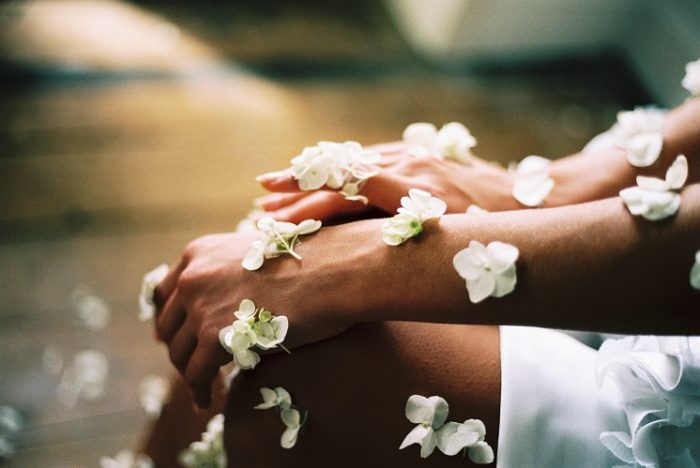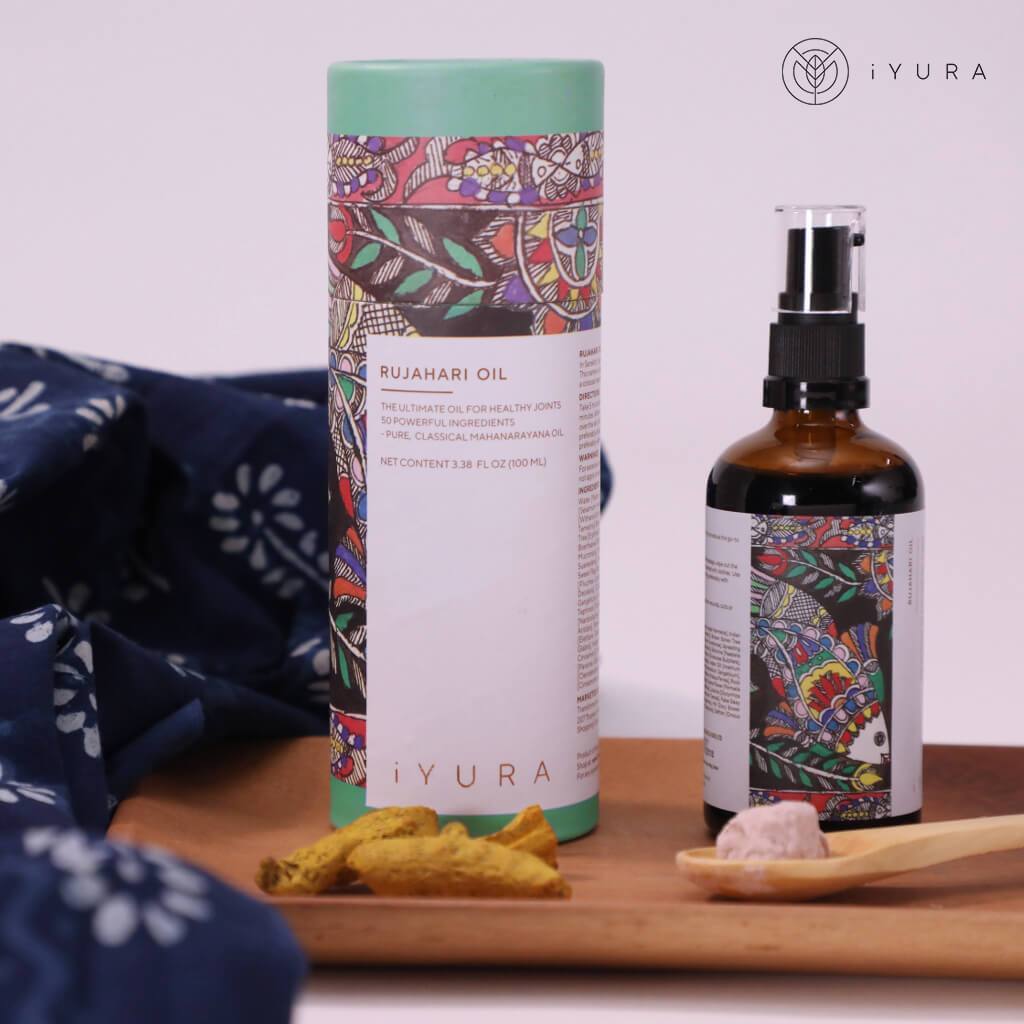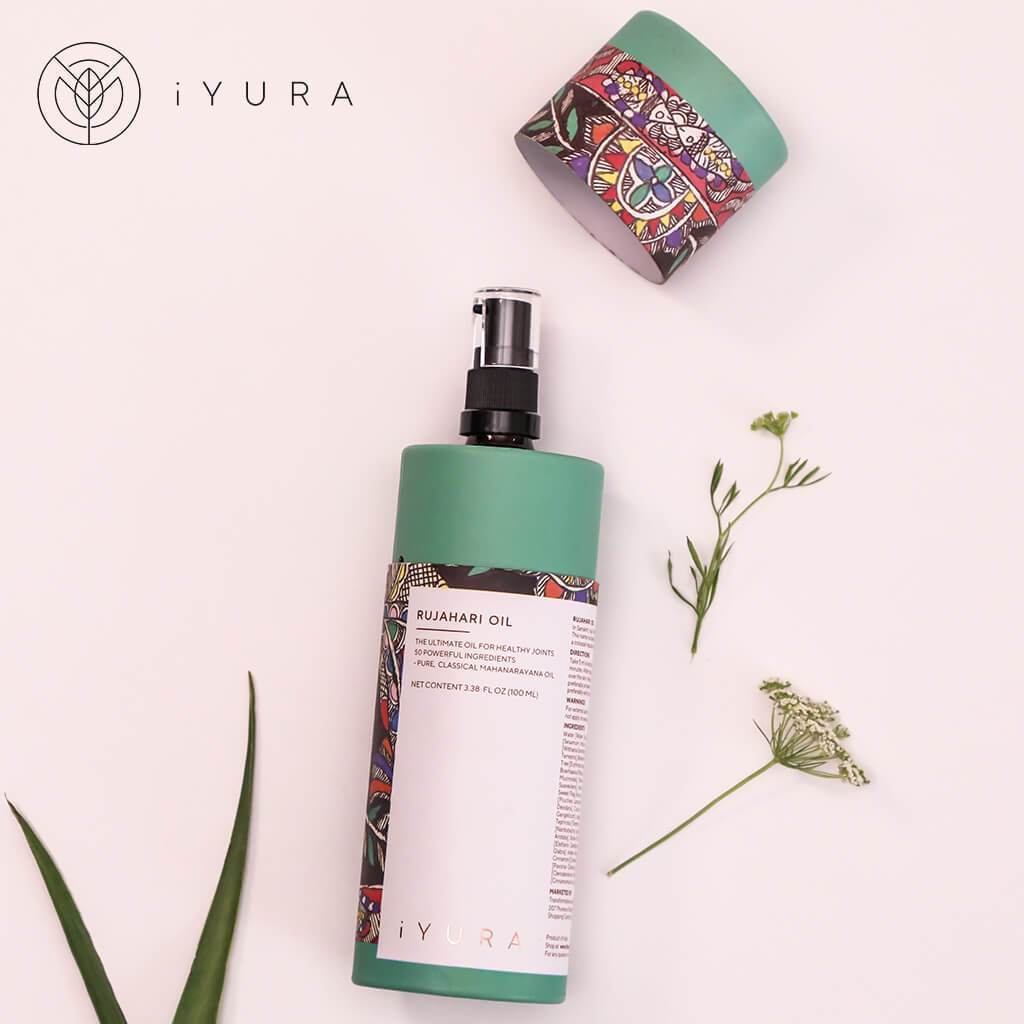This post is sponsored by The Ayurveda Experience—an Elephant Mindful Partner. They’re dedicated to making Ayurveda more accessible to everyone and using only quality, authentic, healthy ingredients. May it be of benefit! ~ ed.
Rujahari (rouge-aah-haaree) is one of the most revered oils in ancient Ayurvedic texts.
Here’s a short story that illustrates just why it’s so prized as a therapeutic remedy:
A 45-year-old American woman is travelling through Asia with her 76-year-old mother. It’s the trip of a lifetime, and their last destination on the itinerary is India.
But by the time they arrive, the mother is tired—the discomfort in her lower back that’s been bothering her for the last seven years is worse than ever thanks to all the traveling time—and the daughter’s knees are acting up from all the walking they’ve been doing.
On their second day in India, they visit an Ayurvedic Center, meet an Ayurvedic practitioner and tell her about their concerns. (In India, Ayurveda is one of the mainstream medical sciences with full-fledged Ayurvedic Hospitals and medical care.)
The practitioner recommends an hour-long massage therapy session each, with a specific Ayurvedic oil, and they go for it…
Days of exhaustion seem to wear off in that single hour and the daughter gets off the massage bed feeling super-energized.
“That was incredible!” she tells the massage therapist. “You probably saved our holiday. When we walked in, I felt like I was done, with no energy to explore this city—but now here I am again!” She pauses, then asks, “By the way, what was that oil? It seemed like something quite different. I mean, it wasn’t the usual fragrant Thai Coconut and Jasmine or French Lavender sort of massage oil. It smelled like herbs, but even for an herbal oil, it had a different feel to it. I don’t know how to describe it!”
The therapist smiles and says, “You’ve been oiled by the stuff of legends, ma’am!”
The daughter is confused and as they walk out, she sees her mother at the counter, picking up three bottles of this same oil! Even before the daughter can ask her mother, she beams at her and says, “I feel so good! I’m taking three bottles of that oil!”
The therapist says, “This is why, ma’am, I said that this is the stuff of legends! It contains over 50 herbs and many of them have been studied for their wonderful effects.”
“This oil is inspired by the famous Mahanarayana Oil, which is highly revered in India, and Ayurvedic practitioners recommend it in a variety of conditions caused by aggravated Vata imbalance. If you’re asking, ‘What on earth is that?,’ well, you know that dryness of mouth and throat you feel on flights? Irregularities in your bowels, from constipation to diarrhoea? Dry skin? Anxiety? That sound of cracking of joints? All of these happen when the element of air and space (Vata = air + space) becomes imbalanced. Travel quickly disrupts Vata but Vata can get aggravated at any time, particularly in cold, dry weather conditions.”
Here are just a few of the 50 super-herbs found in Rujahari Oil:
Get your own bottle of Rujahari Oil* now >>
*This product contains cow’s milk—in Ayurveda, cow’s milk is sacred, as are cows. This does mean, however, that it’s not suitable for vegans.
Ashwagandha [Withania Somnifera]
“This herb is documented to be a Rasayana herb (that which promotes longevity) and is traditionally used to provide strength and is useful in general weakness.”
Also known as Indian ginseng and winter cherry, this super-herb has been used for over 3,000 years to relieve occasional stress, increase energy levels and improve concentration. Ashwagandha is well-known for oral consumption but not as much for its topical benefits, which are numerous.
Shatavari [Asparagus Racemosus]
This member of the asparagus family is touted as the “female tonic.” A very popular herb, Shatavari is used both internally and externally, known for its balancing properties. There are also ingredients like Gokshura, which may help maintain healthy movement.
Of the more than 50 herbs in this oil, each has tremendous Vata dosha balancing benefits in different ways, but one thing which is common across many of them is their soothing effect. The base oil in which these herbs are meticulously cooked is Sesame Oil—and while it may seem like just another simple cooking oil, it also provides superlative moisture, and is used as a part of many ointments to soothe the skin.
“Using this oil for regular massage also makes the body attractive and strong. It slows accelerated aging and helps maintain youthful energy till late in one’s life and promotes longevity.” ~ Bhaishajya Ratnavali
In addition, Rujahari oil contains both saffron and turmeric as well as five other important herbs that have been individually as well as collectively researched in India for their deep relaxation and soothing effects.
-
Maintain flexibility and youthful agility
-
Promote healthy muscles and joints
-
Support comfortable physical movement
-
Soothe discomfort and stiffness
Find out more about Rujahari Oil* here >>
*This product contains cow’s milk—in Ayurveda, cow’s milk is sacred, as are cows. This does mean, however, that it’s not suitable for vegans.
In Sanskrit, “ruja” refers to suffering and “har” refers to the one who “seizes,” “takes away,” or “liberates.”
In India, not only does this oil promote great skin, it’s popular for its use by those who wish to massage their muscles or those who want to relax their nerves or support their joints and remain active.
How to use Rujahari oil
Take 5 ml of oil. Warm it, and massage gently into the joints, muscles, and skin for 15 – 20 minutes.
After the massage, wipe out excessive oil that has remained unabsorbed over the skin, if any. Keep the massaged area warm, covered with clothes.
Use Rujahari oil preferably at bedtime. Leave the oil applied on overnight and wash in the morning, preferably with lukewarm water.
Continue to use daily for at least 3 months.
Please note: At no point is The Ayurveda Experience claiming that this oil can cure, treat, heal or mitigate a medical condition or a disease. This is a natural, herbal formulation which is just meant to provide additional wellness support.
All this information is based on ancient Ayurvedic texts as well as information taken from several research papers publicly available. None of these statements have been evaluated by the FDA. It is always a good practice to consult your primary care practitioner before you make any dietary or lifestyle change in your life.





Read 0 comments and reply